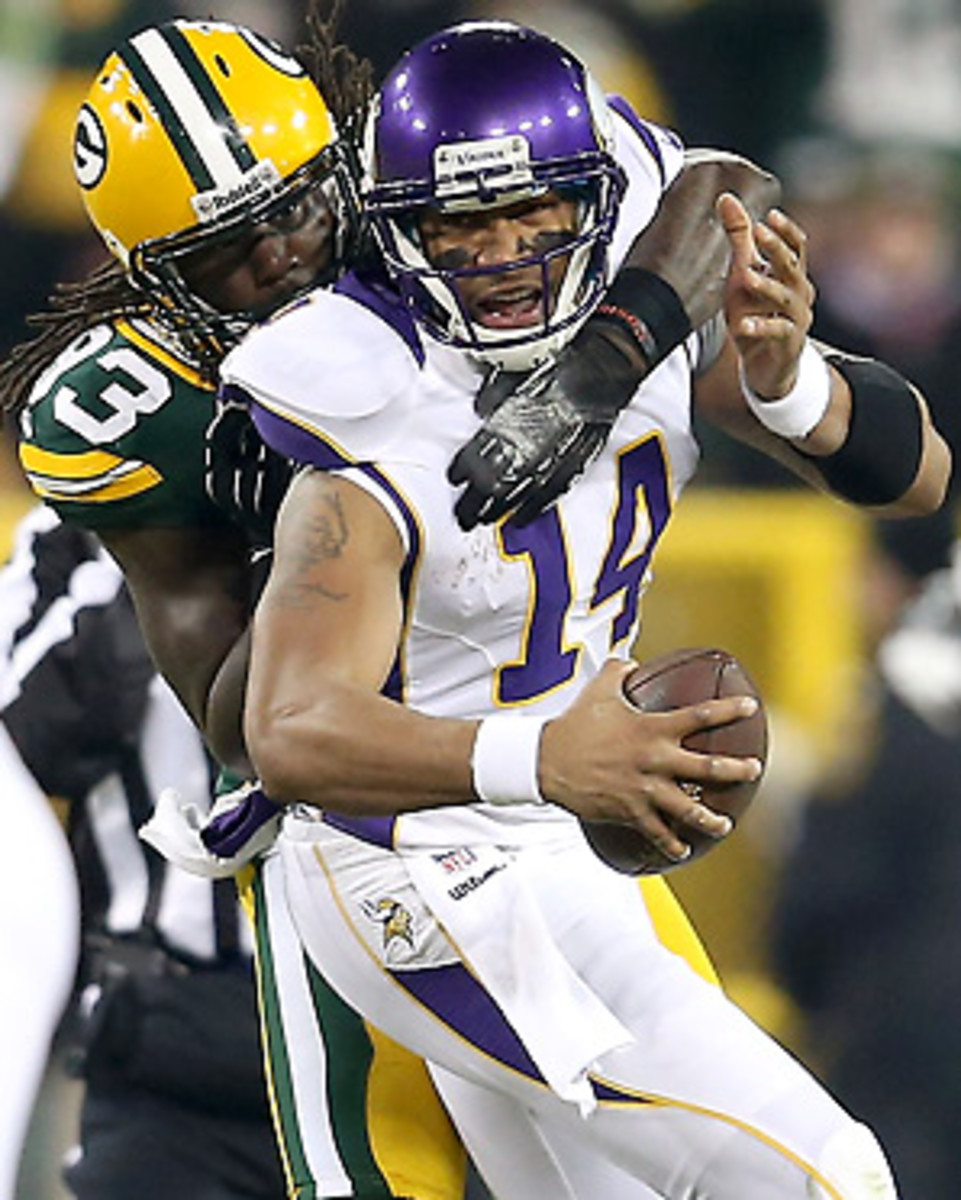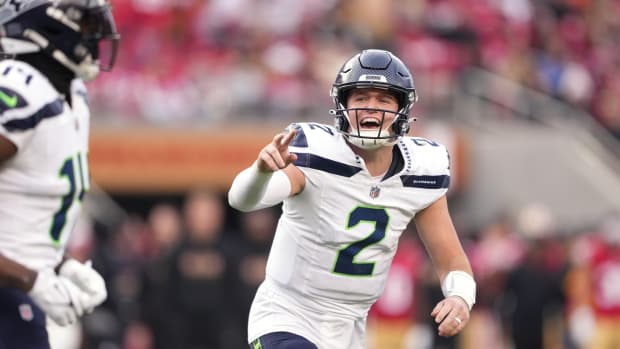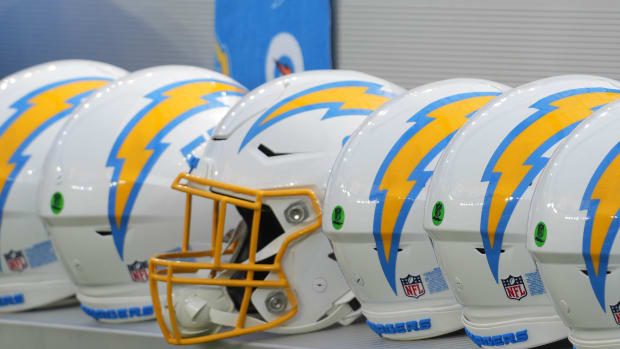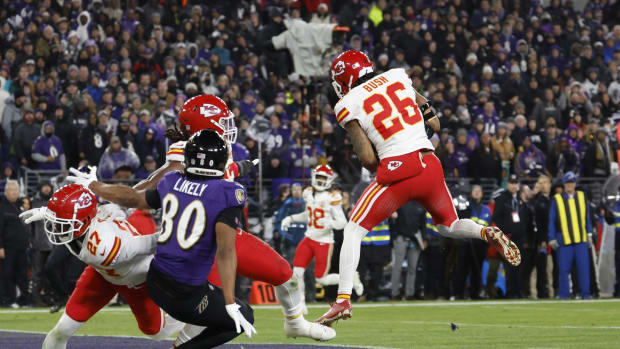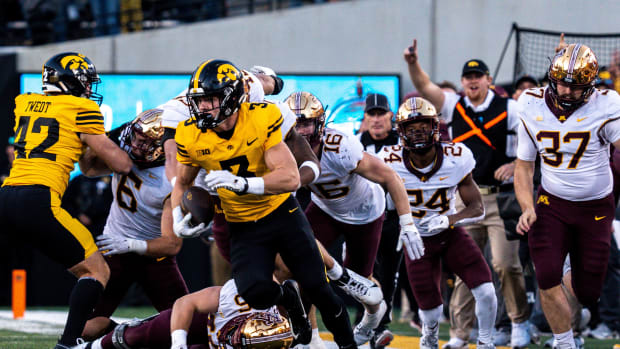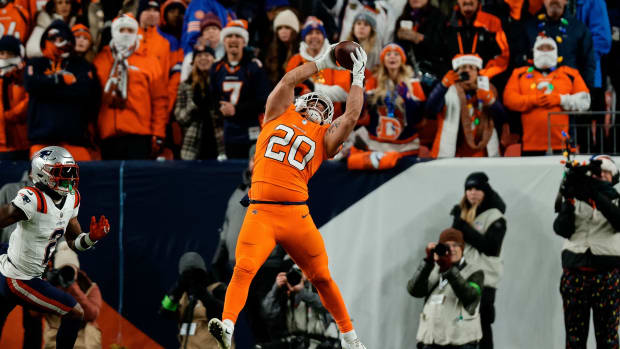Webb's surprise turn under center limits Vikes in loss to Packers
GREEN BAY, Wisc. -- For five minutes and 26 seconds, it looked as if it was going to work. Three hours before the kickoff of the Vikings' Wild Card playoff game against the Packers, a game that the Vikings would lose in convincing fashion, 24-10, Christian Ponder, Minnesota's starting (and often maligned) quarterback for all 16 games this year, lobbed about 10 throws inside Lambeau Field and realized that his deeply bruised right triceps would prevent him from playing.
"I just couldn't get my arm in the proper position to throw the ball," Ponder would say, and so head coach Leslie Frazier informed his backup, Joe Webb, that the evening's job was his. During the majority of the game's first drive, it seemed as if it would not matter that Webb was the first player to ever start a playoff game at quarterback despite not having thrown a single pass during the regular season. In fact, it seemed as if Webb might not have to throw the ball at all, so effectively did he and Adrian Peterson -- who in 2012 rushed for 409 yards in two games against the Packers, one of those games coming just last week -- run with it.
The Vikings' first eight offensive plays were rushing attempts, and when they weren't made by Peterson -- he had six carries for 31 yards on the opening drive -- they were made by the 26-year-old Webb, a sixth-round pick in 2010 who runs the 40-yard dash in 4.43 seconds. Webb ran twice, out of the shotgun, for gains of 17 and five yards, and the Packers seemed powerless to stop Minnesota's newly two-headed rushing attack. You might have begun to imagine the breathless post-game headlines, in the Twin Cities and beyond: MIGHTY JOE WEBB, perhaps. WORLD WIDE WEBB. "Yeah, yeah, we definitely had something going," Peterson would later say of those first eight plays, as he stood in full pads in front of his locker, his elbows stained white with paint.
Then it was 3rd-and-7 on the Packers' 15, and it was time for Webb to throw, and you saw, all of sudden, why it is not preferable to start a quarterback who hadn't attempted a pass that counted in a year and four days, no matter his foot speed. He threw his first pass into the ground, several yards short of his intended receiver, Michael Jenkins. Blair Walsh hit the ensuing 33-yard field goal, and the Vikings, deep down, knew that they had produced four points too few. "We have to have a seven, instead of a three," Peterson said. "That kind of hurt us."
The Packers went three-and-out on their own first drive, but already it seemed as if the game's momentum had permanently shifted. Ponder did not play at an elite level during the regular season -- he produced just 6.08 yards per passing attempt, only better than Jacksonville's Blaine Gabbert -- but still, he has the occasional big passing play in him, such the perfect 65-yard strike he threw to Jarius Wright in the fourth quarter of Minnesota's Week 17 game against these same Packers. Webb, the Packers could tell, had no such ability -- when he wasn't throwing bounce passes, he was throwing bombs five and 10 yards past the reach of his receivers -- and soon they proved that an entirely one-dimensional attack can almost always be stopped, even if that one dimension is very good. "After the first drive, they made some adjustments and ended up stopping our run," left tackle Matt Kalil said. "It's not hard to figure out what we're going to do. We're great at running the ball. But they're a great team, and they did a good job."
The Packers devoted their defensive energies almost exclusively to the Vikings' rush, and they did so, Peterson noticed, in an impressively measured way. "They played more patient -- stayed backside, tried to take away the cut back," he said. "Played slow, instead of being very aggressive and overpursuing plays. They were kind of able to bottle up the run game."
With that taken care of, it was time for the Packers' offense, led by Aaron Rodgers, to take control. Even though he played nearly the entire first quarter with a 3-0 deficit, Rodgers performed with the confidence of a man who, in his last five starts against Minnesota, had completed 74.7 percent of his passes, had thrown for 1,537 yards with a 16:1 touchdown to interception ratio and had posted a quarterback rating of 132.5. Rodgers, of course, is capable of pyrotechnics, but on Saturday night he played methodically, as if he knew none were needed.
Indeed, his final statistics were, for him, pedestrian. He completed 23 of 33 passes for 274 yards and one touchdown. But Rodgers seemed in command throughout, finding 10 different receivers, including DuJuan Harris, the undrafted second-year running back, five times for 53 yards. By halftime, after rushing touchdowns by Harris and John Kuhn, with a Mason Crosby field goal in between, the score was 17-3 in the Packers favor, and the game seemed largely out of reach for the Vikings. After Rodgers hit Kuhn with a nine-yard touchdown with nine and a half minutes remaining in the third quarter, to make the score 24-3, it really was out of reach, and the Packers spent the rest of the game essentially running out the clock.
By the end of the third, Webb had completed 7 of 20 passes for just 61 yards, and only a few long garbage-time strikes -- including a 50-yard touchdown to an uncovered Jenkins with less than four minutes remaining in the game -- prevented his passing numbers from looking truly abominable (he finished 11 of 30, for 180 yards, with one touchdown and one interception). After it was over, he dressed slowly in a navy blazer and tie, next to Ponder, who needed help from a Vikings' official to pull his blue Lacoste v-neck sweater over his aching right arm. Then Webb walked to the press conference room, in which, despite standing 6-foot-4 and ascending a stage, he looked small. "There's a lot of plays I'd like to have back -- I haven't been tested on the field since August, but that's no excuse," he said. "Hopefully we could have had a couple more drives like the first one," he said. "Can't go back in the past." Then he repeated, "Can't go back in the past."
The Packers, meanwhile, were only looking forward, to San Francisco, where they will play next Saturday night against a 49ers">49ers team that will prove far more dynamic than the Webb-led Vikings. Even though the temperature in Lambeau hovered around freezing, this game proved little more than a warm-up for the Packers, a night to reestablish the confidence of their rushing defense -- they ended up holding the great Adrian Peterson to 99 yards, after all -- and a night on which the offense could play without pushing itself, without opening up its throttle.
Next week, they will face a quarterback who can both run and throw, in the 49ers' Colin Kaepernick, and a defense that ranked third in the league in yards allowed. For the Packers, next week will be the real thing.
































